

Media Literacy Now. Arizona NEW Spot127, KJZZ’s youth media center, empowers teens to find their voices and engage with their communities through photo, audio and video storytelling.
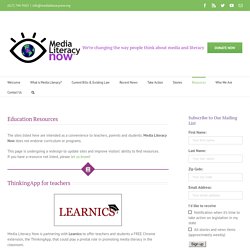
California – San Francisco/Northern California About-Face offers workshops in school and after school to girls grades 7-12 to identify and address harmful media messages that affect self esteem and body image. The non-profit maintains an educational web site and conducts speaker series in local schools and colleges to promote positive self image. Common Sense Education offers a library of independent age-based ratings and reviews for movies, books, games, apps, TV shows, websites, and music. Big Picture Educational Consulting offers lesson plans, student viewing guides and brochures that focus on issue driven film and television programs. California – Los Angeles/Southern California Cyberwise sponsors workshops for schools and companies. California – San Diego Connecticut Illinois – Chicago Massachusetts Missouri New Hampshire New York.
How Can School Librarians Teach Media Literacy in Today's Highly Charged Media Landscape? I have been thinking quite a bit about media literacy for a long time now, and I have noticed that my training and career as a school librarian have really impacted how I consume media. I’m not able to casually listen to news on the radio, view a political ad on television, see a billboard, or hear a coworker discuss the day’s events without filtering those messages through several lenses, most notably the CRAAP detector I most often taught my middle and high school students. Currency, Reliability, Authority, Accuracy, and Purpose are still my go-to means of determining the value of a particular piece of media, and I continually consider each aspect of media messages unconsciously as I move through my day. Literacies for Research: Teaching Students How to Research Successfully in a Digital Landscape - Google Slides.
Brooklyn Public Library Offers Online PD Course on Information Literacy. As the coordinator for school outreach at the Brooklyn Public Library (BPL), Amy Mikel knows the value of professional development for teachers.
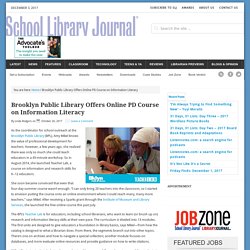
However, a few years ago, she realized there was only so much she could teach educators in a 45-minute workshop. So in August 2014, she launched Teacher Lab, a course on information and research skills for K–12 educators. She soon became convinced that even that four-day summer course wasn’t enough. “I can only bring 20 teachers into the classroom, so I started to envision putting the course onto an online environment where I could reach many, many more teachers,” says Mikel.
After receiving a Sparks grant through the Institute of Museum and Library Services, she launched the free online course this past July. The BPL’s Teacher Lab is for educators, including school librarians, who want to learn (or brush up on) research and information literacy skills at their own pace. Educators must submit a final assignment, which Mikel grades. 200 Purged. University of Virginia Library. University of Virginia Library » The Source Deck What is it?
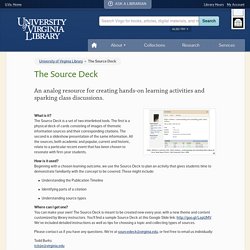
The Source Deck is a set of two interlinked tools. The first is a physical deck of cards consisting of images of thematic information sources and their corresponding citations. The second is a slideshow presentation of the same information. All the sources, both academic and popular, current and historic, relate to a particular recent event that has been chosen to resonate with first-year students. VAASL 2015 - Is My High School Senior Ready to Be Your College Freshmen? - The Sassy Librarian. VAASL 2015 - Is My High School Senior Ready to Be Your College Freshman?
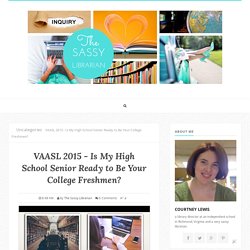
From SassyLibrarian Busy at my new school, doing a renovation while acclimating to a new job wasn't quite enough for me - I had to also decide to do a research project about tools and techniques that, in addition to a quality information literacy program, would help students during their transition to college level research that first year. This is the preliminary data that I presented on November 20, 2015 at the Virginia Association of School Librarians in Williamsburg. Online Research Model. Use tabs above to access Online Research Models & Slam Dunks for each level and subject.
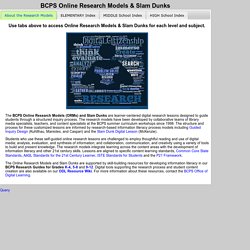
The BCPS Online Research Models (ORMs) and Slam Dunks are learner-centered digital research lessons designed to guide students through a structured inquiry process. The research models have been developed by collaborative teams of library media specialists, teachers, and content specialists at the BCPS summer curriculum workshops since 1998. Get Ready Skill 1: Make connections and build background knowledge. Skill 1: Make connections and build background knowledge.
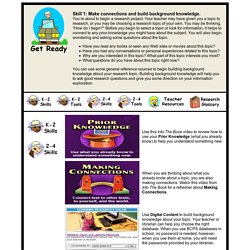
Empowerstudents.wikispaces. Jamie McKenzie is the Editor of From Now On - The Educational Technology Journal, a Web-based "ZINE" published online since 1991.
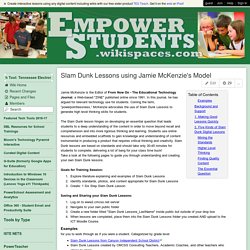
In this journal, he has argued for relevant technology use for students. Coining the term, “powerpointlessness,” McKenzie advocates the use of Slam Dunk Lessons to generate high level thinking skills for students. Making Slam Dunk Lessons. By Jamie McKenzie (About Author) This article first appeared in CDW (CDW-G - K-12 EDTECH - March/April 2006 - How To: Nothing But Net) and is republished here with permission. © 2006 CDW, all rights reserved.
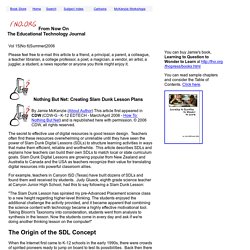
The secret to effective use of digital resources is good lesson design. Teachers often find these resources overwhelming or unreliable until they have seen the power of Slam Dunk Digital Lessons (SDLs) to structure learning activities in ways that make them efficient, reliable and worthwhile. The NoTime Slam Dunk Digital Lesson. Teachers are so busy that they just don't have much time for lesson design and development.
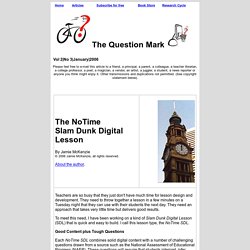
They need to throw together a lesson in a few minutes on a Tuesday night that they can use with their students the next day. They need an approach that takes very little time but delivers good results. To meet this need, I have been working on a kind of Slam Dunk Digital Lesson (SDL) that is quick and easy to build. I call this lesson type, the NoTime SDL. Good Content plus Tough Questions Each NoTime SDL combines solid digital content with a number of challenging questions drawn from a source such as the National Assessment of Educational Progress (NAEP).
For examples of these NAEP items drawn from the 2002 Reading Test, go to the bottom of the page in Chapter Two of the Reading Framework for the 2005 National Assessment of Educational Progress "How Is the NAEP Reading Assessment Designed? " You will find items listed such as the following: